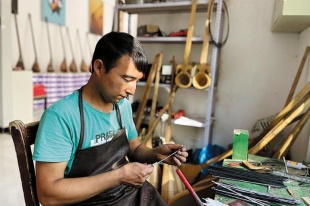Craftsmen strike a chord
Makers of musical instruments tune into a prosperous future in Xinjiang, Xing Wen and Mao Weihua report in Urumqi.


The social-media tool
"The sound of stringed instruments like the dutar and the tembur can release stress and spark joy, helping me embrace a moment of tranquility," Ahmat Nurdun, 29, says, explaining why he feels a connection with the instruments.
As the youngest son of Nurdun Ismayil, a veteran instrument maker in the village, Ahmat chose to follow in his father's footsteps at the age of 15.
He witnessed his father's devotion to the craftsmanship of making the instruments and gradually formed an interest in it himself.
Based on similar logic, in 2019, Ahmat started to post clips of how he makes the instruments and the family playing them together on the short video sharing platform Kuaishou.
His own devotion to the art and the wonderful sound of the instruments have helped him attract more than 48,000 followers on the platform.
"Some viewers leave comments under my videos expressing their eagerness to purchase our handmade instruments," says Ahmat.
It helps the family to reach out to customers in Turkey, Kazakhstan, Uzbekistan and some other countries.
Social media also serves as an important way for Anwar Axim, a 29-year-old instrument maker in Towankursak village of Shufu county, Kashgar prefecture, to promote his products.
He uses instant-messaging service WeChat to share photos and videos of the handmade instruments he crafts.
And the local government also helps the instrument makers to endorse their products through livestreaming shows.
"My clients are mainly the instrument store owners in Ili Kazak autonomous prefecture and Urumqi," he says. "Most of the time, demand exceeds supply."
Since recently becoming a father, Anwar, the family's breadwinner, has an ever-stronger drive and energy for the business, and he is capable of making more than 50 instruments of different sizes within a month.
"I still have to be patient and careful when engulfing myself in the craft," he says.
More than 500 people from the 270 or so households in his village will pick up the craft during the farming off-season to supplement their income. Therefore, Towankursak village is also known as "the village of instruments".
The examples of Jiayi and Towankursak villages have been followed by many other places across the region. The burgeoning musical instrument industry is hitting the right note in more ways than one, fueling Xinjiang's poverty alleviation endeavors and economic growth.





































